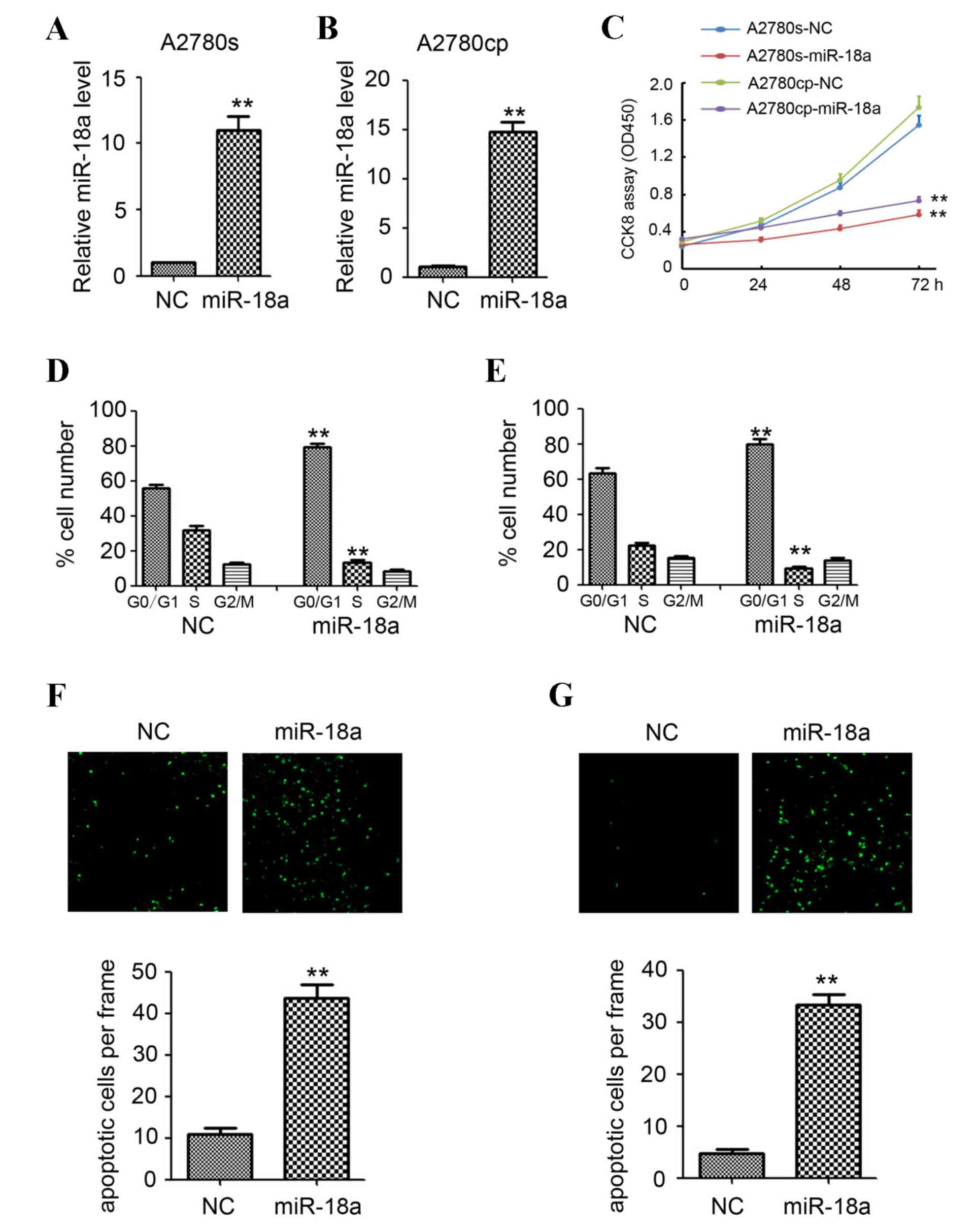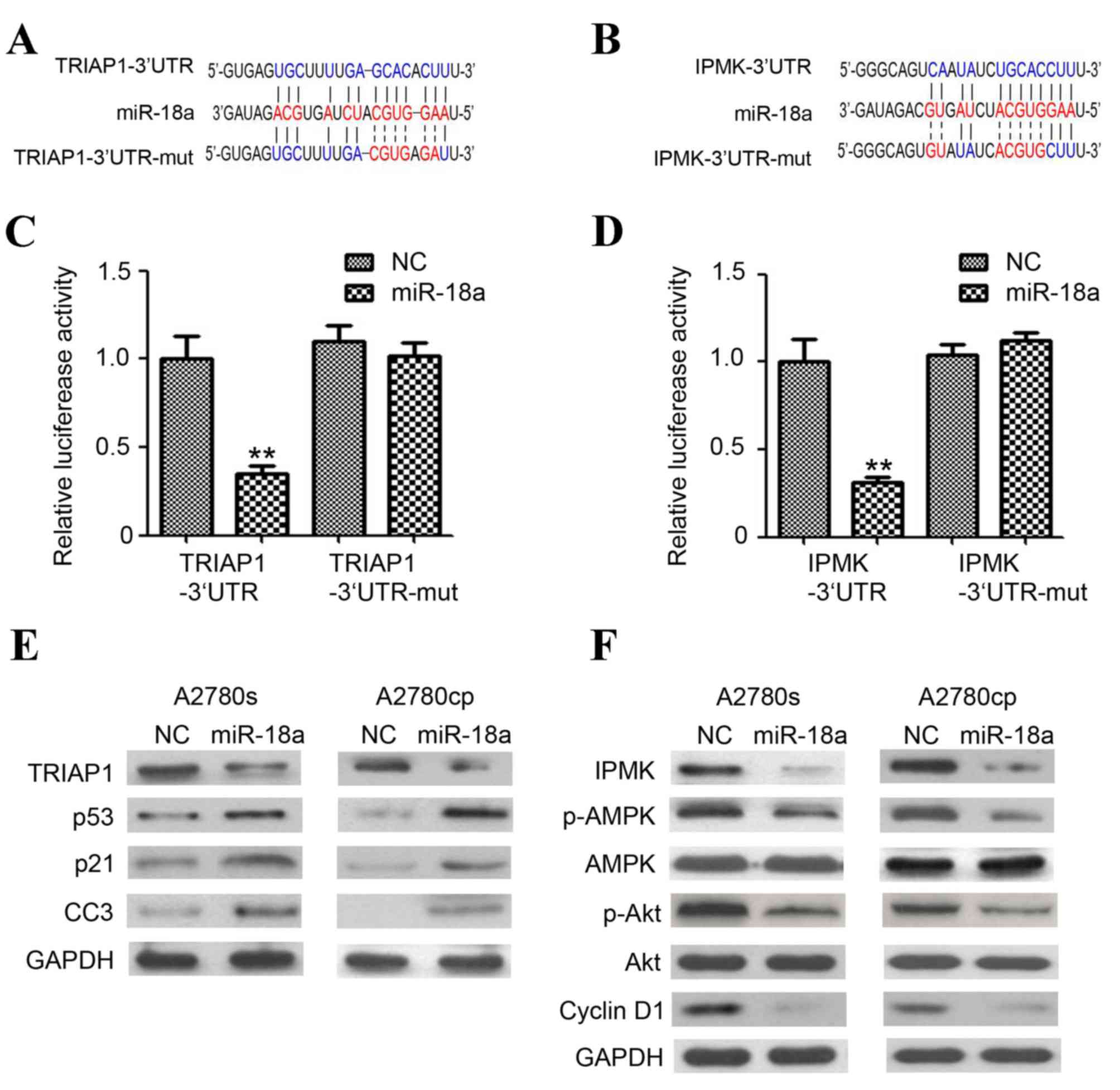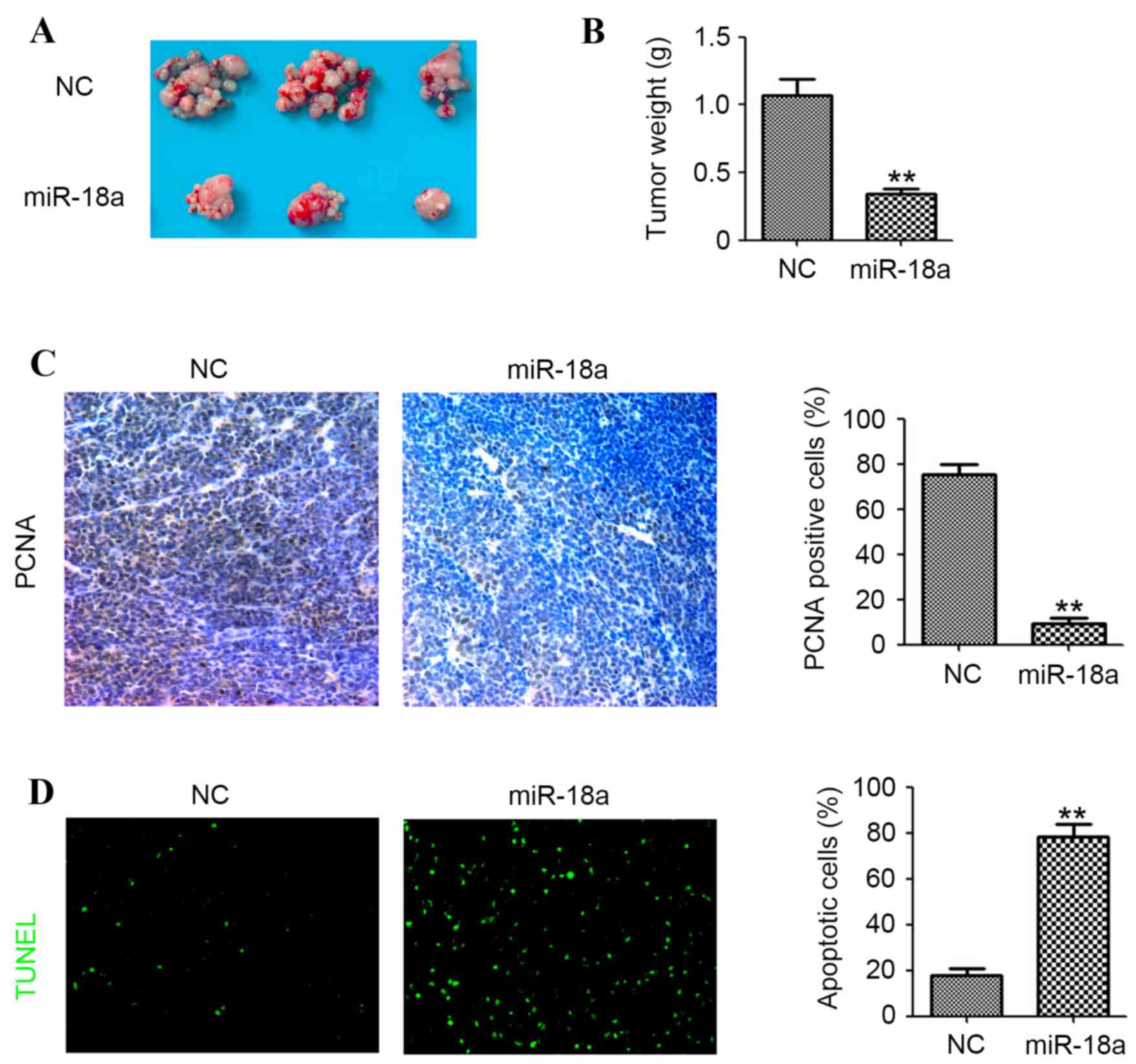|
1
|
Siegel RL, Miller KD and Jemal A: Cancer
statistics, 2015. CA Cancer J Clin. 65:5–29. 2015. View Article : Google Scholar : PubMed/NCBI
|
|
2
|
Coleman MP, Forman D, Bryant H, Butler J,
Rachet B, Maringe C, Nur U, Tracey E, Coory M, Hatcher J, et al
Cancer survival in Australia, Canada, Denmark, Norway, Sweden, and
the UK, 1995–2007 (the International Cancer Benchmarking
Partnership), : An analysis of population-based cancer registry
data. Lancet. 377:127–138. 2011. View Article : Google Scholar : PubMed/NCBI
|
|
3
|
Ambros V: The functions of animal
microRNAs. Nature. 431:350–355. 2004. View Article : Google Scholar : PubMed/NCBI
|
|
4
|
Nie J, Liu L, Zheng W, Chen L, Wu X, Xu Y,
Du X and Han W: microRNA-365, down-regulated in colon cancer,
inhibits cell cycle progression and promotes apoptosis of colon
cancer cells by probably targeting Cyclin D1 and Bcl-2.
Carcinogenesis. 33:220–225. 2012. View Article : Google Scholar : PubMed/NCBI
|
|
5
|
Yu PN, Yan MD, Lai HC, Huang RL, Chou YC,
Lin WC, Yeh LT and Lin YW: Downregulation of miR-29 contributes to
cisplatin resistance of ovarian cancer cells. Int J Cancer.
134:542–551. 2014. View Article : Google Scholar : PubMed/NCBI
|
|
6
|
Xia T, Liao Q, Jiang X, Shao Y, Xiao B, Xi
Y and Guo J: Long noncoding RNA associated-competing endogenous
RNAs in gastric cancer. Sci Rep. 4:60882014. View Article : Google Scholar : PubMed/NCBI
|
|
7
|
Volinia S, Calin GA, Liu CG, Ambs S,
Cimmino A, Petrocca F, Visone R, Iorio M, Roldo C, Ferracin M, et
al: A microRNA expression signature of human solid tumors defines
cancer gene targets. Proc Natl Acad Sci USA. 103:2257–2261. 2006.
View Article : Google Scholar : PubMed/NCBI
|
|
8
|
Mu P, Han YC, Betel D, Yao E, Squatrito M,
Ogrodowski P, de Stanchina E, D'Andrea A, Sander C and Ventura A:
Genetic dissection of the miR-17~92 cluster of microRNAs in
Myc-induced B-cell lymphomas. Genes Dev. 23:2806–2811. 2009.
View Article : Google Scholar : PubMed/NCBI
|
|
9
|
Olive V, Bennett MJ, Walker JC, Ma C,
Jiang I, Cordon-Cardo C, Li QJ, Lowe SW, Hannon GJ and He L: miR-19
is a key oncogenic component of mir-17-92. Genes Dev. 23:2839–2849.
2009. View Article : Google Scholar : PubMed/NCBI
|
|
10
|
Luo Z, Dai Y, Zhang L, Jiang C, Li Z, Yang
J, McCarthy JB, She X, Zhang W, Ma J, et al: miR-18a promotes
malignant progression by impairing microRNA biogenesis in
nasopharyngeal carcinoma. Carcinogenesis. 34:415–425. 2013.
View Article : Google Scholar : PubMed/NCBI
|
|
11
|
Hsu TI, Hsu CH, Lee KH, Lin JT, Chen CS,
Chang KC, Su CY, Hsiao M and Lu PJ: MicroRNA-18a is elevated in
prostate cancer and promotes tumorigenesis through suppressing STK4
in vitro and in vivo. Oncogenesis. 3:e992014. View Article : Google Scholar : PubMed/NCBI
|
|
12
|
Su ZX, Zhao J, Rong ZH, Wu YG, Geng WM and
Qin CK: Diagnostic and prognostic value of circulating miR-18a in
the plasma of patients with gastric cancer. Tumour Biol.
35:12119–12125. 2014. View Article : Google Scholar : PubMed/NCBI
|
|
13
|
Wu W, Takanashi M, Borjigin N, Ohno SI,
Fujita K, Hoshino S, Osaka Y, Tsuchida A and Kuroda M: MicroRNA-18a
modulates STAT3 activity through negative regulation of PIAS3
during gastric adenocarcinogenesis. Br J Cancer. 108:653–661. 2013.
View Article : Google Scholar : PubMed/NCBI
|
|
14
|
Krutilina R, Sun W, Sethuraman A, Brown M,
Seagroves TN, Pfeffer LM, Ignatova T and Fan M: MicroRNA-18a
inhibits hypoxia-inducible factor 1α activity and lung metastasis
in basal breast cancers. Breast Cancer Res. 16:R782014. View Article : Google Scholar : PubMed/NCBI
|
|
15
|
Humphreys KJ, McKinnon RA and Michael MZ:
miR-18a inhibits CDC42 and plays a tumour suppressor role in
colorectal cancer cells. PLoS One. 9:e1122882014. View Article : Google Scholar : PubMed/NCBI
|
|
16
|
Nam EJ, Yoon H, Kim SW, Kim H, Kim YT, Kim
JH, Kim JW and Kim S: MicroRNA expression profiles in serous
ovarian carcinoma. Clin Cancer Res. 14:2690–2695. 2008. View Article : Google Scholar : PubMed/NCBI
|
|
17
|
Dai L, Cui X, Zhang X, Cheng L, Liu Y,
Yang Y, Fan P, Wang Q, Lin Y, Zhang J, et al: SARI inhibits
angiogenesis and tumour growth of human colon cancer through
directly targeting ceruloplasmin. Nat Commun. 7:119962016.
View Article : Google Scholar : PubMed/NCBI
|
|
18
|
Mendell JT: miRiad roles for the miR-17-92
cluster in development and disease. Cell. 133:217–222. 2008.
View Article : Google Scholar : PubMed/NCBI
|
|
19
|
Eiriksdottir G, Johannesdottir G,
Ingvarsson S, Björnsdottir IB, Jonasson JG, Agnarsson BA,
Hallgrimsson J, Gudmundsson J, Egilsson V, Sigurdsson H and
Barkardottir RB: Mapping loss of heterozygosity at chromosome 13q:
loss at 13q12-q13 is associated with breast tumour progression and
poor prognosis. Eur J Cancer. 34:2076–2081. 1998. View Article : Google Scholar : PubMed/NCBI
|
|
20
|
Yu Z, Wang C, Wang M, Li Z, Casimiro MC,
Liu M, Wu K, Whittle J, Ju X, Hyslop T, et al: A cyclin D1/microRNA
17/20 regulatory feedback loop in control of breast cancer cell
proliferation. J Cell Biol. 182:509–517. 2008. View Article : Google Scholar : PubMed/NCBI
|
|
21
|
Hossain A, Kuo MT and Saunders GF:
Mir-17-5p regulates breast cancer cell proliferation by inhibiting
translation of AIB1 mRNA. Mol Cell Biol. 26:8191–8201. 2006.
View Article : Google Scholar : PubMed/NCBI
|
|
22
|
Castellano L, Giamas G, Jacob J, Coombes
RC, Lucchesi W, Thiruchelvam P, Barton G, Jiao LR, Wait R, Waxman
J, et al: The estrogen receptor-alpha-induced microRNA signature
regulates itself and its transcriptional response. Proc Natl Acad
Sci USA. 106:15732–15737. 2009. View Article : Google Scholar : PubMed/NCBI
|
|
23
|
Yu Z, Willmarth NE, Zhou J, Katiyar S,
Wang M, Liu Y, McCue PA, Quong AA, Lisanti MP and Pestell RG:
microRNA 17/20 inhibits cellular invasion and tumor metastasis in
breast cancer by heterotypic signaling. Proc Natl Acad Sci USA.
107:8231–8236. 2010. View Article : Google Scholar : PubMed/NCBI
|
|
24
|
Chakraborty S, Mehtab S, Patwardhan A and
Krishnan Y: Pri-miR-17-92a transcript folds into a tertiary
structure and autoregulates its processing. RNA. 18:1014–1028.
2012. View Article : Google Scholar : PubMed/NCBI
|
|
25
|
Chaulk SG, Thede GL, Kent OA, Xu Z, Gesner
EM, Veldhoen RA, Khanna SK, Goping IS, MacMillan AM, Mendell JT, et
al: Role of pri-miRNA tertiary structure in miR-17~92 miRNA
biogenesis. RNA Biol. 8:1105–1114. 2011. View Article : Google Scholar : PubMed/NCBI
|
|
26
|
Shen J, Wang D, Gregory SR, Medico L, Hu
Q, Yan L, Odunsi K, Lele SB, Ambrosone CB, Liu S and Zhao H:
Evaluation of microRNA expression profiles and their associations
with risk alleles in lymphoblastoid cell lines of familial ovarian
cancer. Carcinogenesis. 33:604–612. 2012. View Article : Google Scholar : PubMed/NCBI
|
|
27
|
Park WR and Nakamura Y: p53CSV, a novel
p53-inducible gene involved in the p53-dependent cell-survival
pathway. Cancer Res. 65:1197–1206. 2005. View Article : Google Scholar : PubMed/NCBI
|
|
28
|
Andrysik Z, Kim J, Tan AC and Espinosa JM:
A genetic screen identifies TCF3/E2A and TRIAP1 as pathway-specific
regulators of the cellular response to p53 activation. Cell Rep.
3:1346–1354. 2013. View Article : Google Scholar : PubMed/NCBI
|
|
29
|
Potting C, Tatsuta T, König T, Haag M, Wai
T, Aaltonen MJ and Langer T: TRIAP1/PRELI complexes prevent
apoptosis by mediating intramitochondrial transport of phosphatidic
acid. Cell Metab. 18:287–295. 2013. View Article : Google Scholar : PubMed/NCBI
|
|
30
|
Dailey MJ and Kim S: Inositol
polyphosphate multikinase: An emerging player for the central
action of AMP-activated protein kinase. Biochem Biophys Res Commun.
421:1–3. 2012. View Article : Google Scholar : PubMed/NCBI
|
|
31
|
Kim S, Kim SF, Maag D, Maxwell MJ, Resnick
AC, Juluri KR, Chakraborty A, Koldobskiy MA, Cha SH, Barrow R, et
al: Amino acid signaling to mTOR mediated by inositol polyphosphate
multikinase. Cell Metab. 13:215–221. 2011. View Article : Google Scholar : PubMed/NCBI
|
|
32
|
Roppenser B, Kwon H, Canadien V, Xu R,
Devreotes PN, Grinstein S and Brumell JH: Multiple host kinases
contribute to Akt activation during Salmonella infection. PLoS One.
8:e710152013. View Article : Google Scholar : PubMed/NCBI
|
|
33
|
Maag D, Maxwell MJ, Hardesty DA, Boucher
KL, Choudhari N, Hanno AG, Ma JF, Snowman AS, Pietropaoli JW, Xu R,
et al: Inositol polyphosphate multikinase is a physiologic
PI3-kinase that activates Akt/PKB. Proc Natl Acad Sci USA.
108:1391–1396. 2011. View Article : Google Scholar : PubMed/NCBI
|
|
34
|
Bang S, Kim S, Dailey MJ, Chen Y, Moran
TH, Snyder SH and Kim SF: AMP-activated protein kinase is
physiologically regulated by inositol polyphosphate multikinase.
Proc Natl Acad Sci USA. 109:616–620. 2012. View Article : Google Scholar : PubMed/NCBI
|


















